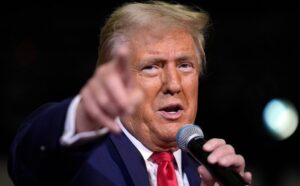Donald Trump’s recent rally at Madison Square Garden showcased a stark evolution in the language of political discourse. With crude jokes, offensive gestures, and an alarming frequency of profanity, Trump has shattered any lingering notion of propriety in American politics. This article delves into the implications of his language, how it reflects broader changes in political communication, and what it might mean for future elections.
The Garden Rally: A New Low?
Crude Humor and Provocative Statements
At the rally, a barrage of inappropriate comments filled the venue. One speaker flipped the middle finger at the opposition, while another made an oral sex joke about Vice President Kamala Harris. These remarks, far from being isolated incidents, highlight a troubling trend in political rhetoric—where crudeness and provocation seem to be the order of the day.
A Shift in Political Discourse
This rally is not an outlier; it represents a significant shift in how candidates communicate. Gone are the days of carefully crafted speeches designed to inspire and unite. Instead, we see a strategy that thrives on shock value and sensationalism. This new norm raises questions about what is acceptable in political discourse.
Historical Context: Trump’s Use of Language
Early Political Career
Trump’s ascent to political prominence was marked by brash statements and a no-holds-barred style. His early speeches, while unorthodox, still adhered to a certain level of decorum expected of presidential candidates. However, this decorum has gradually faded away.
The Evolution of Trump’s Rhetoric
Since his initial campaign in 2016, Trump’s language has become increasingly coarse. According to analyses, he has used explicit language more frequently, indicating a deliberate choice to appeal to certain voter bases through provocative rhetoric.
Profanity in Politics: A Longstanding Issue
Historical Examples
Profanity in politics is not new; past leaders have often pushed boundaries. However, Trump’s blatant use of vulgar language stands out. Figures like Richard Nixon and Lyndon B. Johnson were known for their rough language, but they operated within a context that still valued restraint.
Public Reaction to Offensive Language
The public’s response to vulgar language has varied throughout history. In the past, such language might have resulted in backlash, but with Trump, the rules seem different. Supporters often rally behind his comments, viewing them as refreshing honesty rather than offensive behavior.
The Metrics: Tracking Trump’s Cursing
Frequency and Context
Recent reports indicate that Trump has used profanity more than 1,787 times in 2024 alone. This marks a significant increase from his earlier campaigns, demonstrating a shift toward more explicit language that was once considered taboo.
Comparison with Past Campaigns
An analysis of Trump’s language shows a 69% increase in the use of profanity compared to his first campaign. This dramatic rise suggests that he is not only comfortable using explicit language but is also leveraging it as a tool to connect with his audience.
Media Coverage and Analysis
How the Media Interprets Trump’s Language
Media coverage of Trump’s language often reflects a mix of shock and resignation. Commentators analyze the implications of his words, exploring how they resonate with different segments of the population. However, some media outlets also reinforce his rhetoric, giving it further traction.
The Role of Social Media
Social media amplifies Trump’s messages, allowing them to spread rapidly. His use of platforms like Twitter and Facebook enables him to bypass traditional media filters, creating a direct line to his supporters. This unfiltered communication further normalizes his language.
Also read: Dodgers vs. Yankees Game 3: Shocking Live Updates Revealed
Audience Reaction: Support and Backlash
The Base’s Response
Trump’s base often responds enthusiastically to his crude remarks, viewing them as authenticity. Supporters appreciate his willingness to speak candidly, believing it reflects a break from political correctness.
Critics and Concerned Citizens
Conversely, critics express alarm at the normalization of such language in politics. Many argue that it undermines the dignity of public discourse and sets a poor example for future generations.
Implications for Future Elections
Voter Perception of Language
As Trump’s language evolves, so too does voter perception. Some voters may be drawn to candidates who use strong language, equating it with strength and honesty. Others may feel alienated, preferring leaders who communicate with civility and respect.
The Fine Line Between Humor and Offense
Trump’s rhetoric raises important questions about the fine line between humor and offense. What some view as clever banter, others see as degrading and harmful. This division could shape future election campaigns as candidates navigate their own communication styles.
Conclusion
The rally at Madison Square Garden is a stark reminder of how far political language has strayed from traditional norms. Trump’s use of crude language reflects a broader trend in American politics, one that challenges our understanding of propriety and decency. As we move forward, it will be essential to consider the implications of such language on political discourse and public perception.
Also read: GHOST’s 2025 World Tour: Dates, Venues, and Surprises Revealed
FAQs
How has Trump’s language changed since his first campaign?
Trump’s language has become increasingly coarse, with a significant rise in the use of profanity and explicit remarks.
What impact does crude language have on political discourse?
Crude language can both energize supporters and alienate detractors, reshaping the way candidates communicate.
How do voters perceive Trump’s use of profanity?
Responses vary; some view it as authentic and refreshing, while others see it as disrespectful and damaging.
Is vulgarity in politics a new phenomenon?
While vulgarity isn’t new, Trump’s public use of explicit language marks a significant departure from traditional political decorum.
What might this trend mean for future elections?
The normalization of crude language could influence how candidates communicate and how voters respond, possibly favoring those who embrace strong, direct language.


